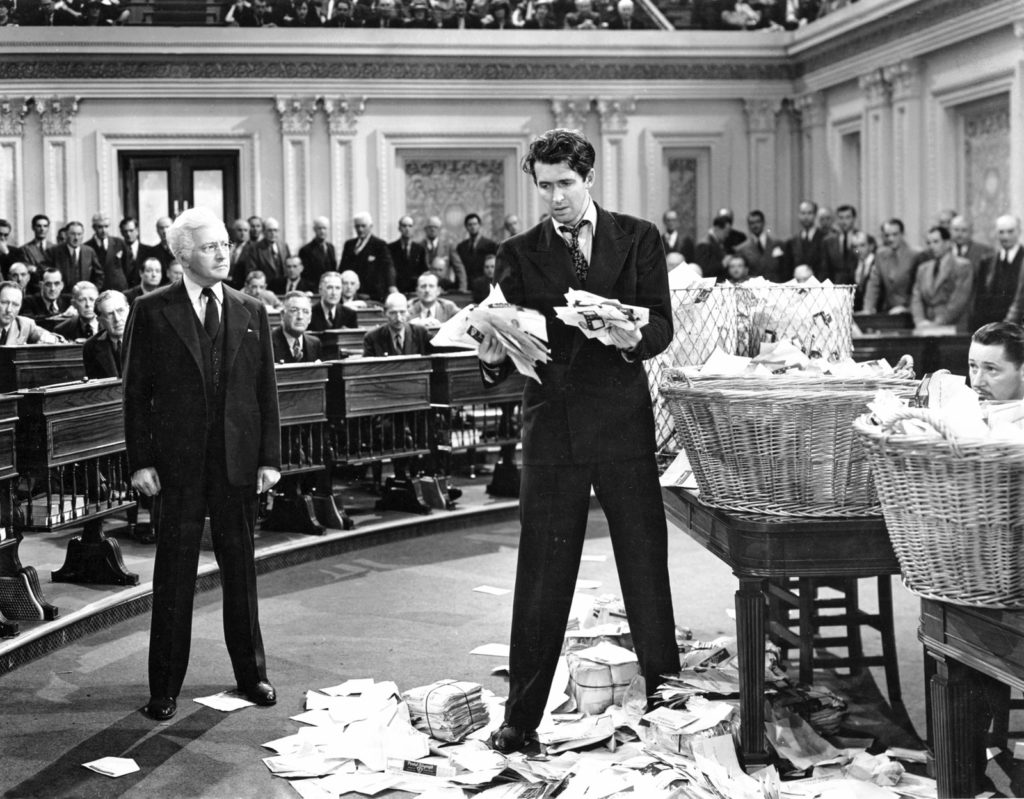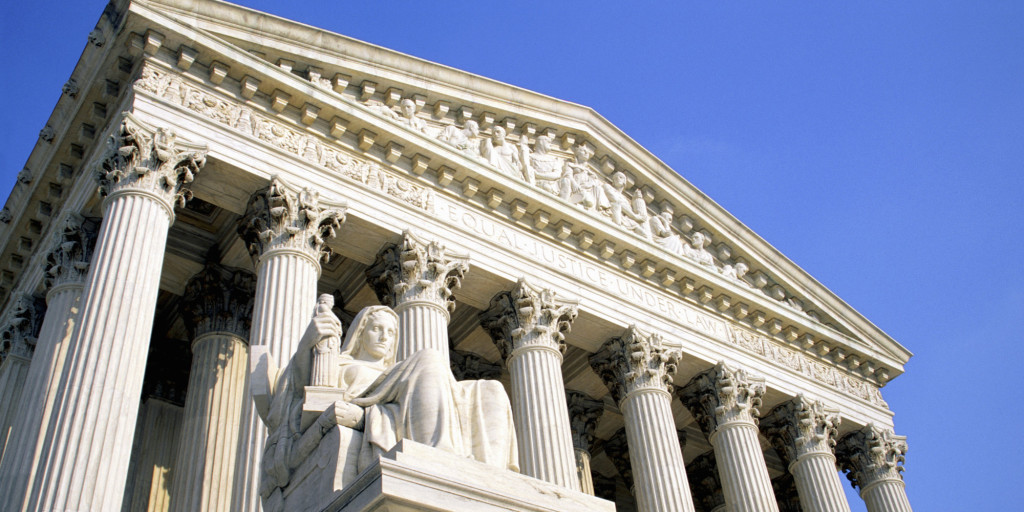Darryl Paulson: The filibuster, the nuclear option and the future of American politics

What little Americans know about the filibuster is due to James Stewart‘s portrayal of Senator Jefferson Smith in the classic movie, Mr. Smith Goes to Washington. In the movie, Senator Smith filibusters a fraudulent land deal until finally collapsing on the Senate floor. This past week, it was the filibuster that collapsed on the Senate floor as the “nuclear option” was invoked by Senate Republicans. History of the filibuster. The early Congress did not recognize the ability to filibuster. Senators could invoke a “previous question motion,” which meant that a simple majority could vote to end debate. Vice President Aaron Burr, as President of the Senate, streamlined the Senate rules in 1805 by persuading fellow Senators to abandon cutting off debate. That move allowed for the possibility of unlimited debate. The first filibuster did not occur until 1837, and the filibuster was seldom used in the 19th century. It was not until 1917 that the Senate adopted Rule 22 or the Cloture Rule, to create a mechanism to halt a filibuster. Rule 22 required a vote of two-thirds of the Senate (then 64 of the 96 senators) to halt a filibuster. Rule 22 came about in response to a request by President Woodrow Wilson to arm merchant marine vessels to protect them from U-boat attacks. A group of 11 progressive senators, led by Republican Robert La Follette of Wisconsin, blocked the bill. Wilson was outraged and condemned “A little group of willful men, representing no opinion but their own … have rendered the great government of the United States helpless and contemptible.” Filibuster rule changes. From 1917 to 1970, only 58 cloture petitions were filed (about one per year), and cloture was invoked only eight times. From 1971 to 2006, the number of cloture petitions jumped to 26 per year and cloture was imposed one-quarter of the time. From 2007 to 2014, cloture petitions were filed 80 times a year and half of the cloture votes were approved. As the use of the filibuster increased, the Senate looked at various ways to modify its use. In 1975, the Senate voted to make it easier to invoke cloture by requiring only a three-fifths vote instead of two-thirds. That would be a short-term solution with limited impact. In 2005, Republicans controlled the Senate and were concerned that Democrats would not approve nominees of George W. Bush. Republicans argued that the use of the filibuster on judicial nominations violated the constitutional authority of the president to name judges with the “advice and consent” of a simple majority of the Senate. Sen. Trent Lott of Mississippi used the word “nuclear” during the debate, and the concept of the “nuclear option” developed. Also in 2005, a “Gang of 14” senators, half Democrat and half Republican, reached a compromise to defuse the “nuclear option.” The Democrats promised not to filibuster Bush’s nominees except under “extraordinary circumstances,” and Republicans promised not to invoke the nuclear option unless they believed the Democrats used the filibuster in non-extraordinary circumstances. On Nov. 21, 2013, the Democrats triggered the nuclear option and eliminated the filibuster for all nominees except for the Supreme Court. They accused Republicans of filibustering an extraordinary number of President Obama‘s nominees. Republicans took back control of the Senate in the 2014 election and kept the Democratic rules in place. On April 6, 2017, Majority Leader Mitch McConnell extended the nuclear option to Supreme Court nominees after it was apparent that Democrats had the votes to filibuster the nomination of Neil Gorsuch to the court. The vote to change the rules to a simple majority passed 52-48 on a straight party-line vote, and the Senate then confirmed Gorsuch with 55 votes, as three Democrats joined the Republicans. Implications of the nuclear option. Now that the filibuster is dead in the nomination process, will it also fall by the wayside with respect to legislation? The answer is likely yes. The larger question is whether the filibuster is a good or bad part of the legislative process? Many argue that the Constitution is premised on majority rights and the filibuster allows a minority to dictate public policy. In other words, it is undemocratic. Supporters of the filibuster contend that it serves a useful purpose. Its use forces legislators to compromise in order to secure passage of major legislation. On controversial issues such as civil rights, a supermajority vote ensures that the legislation has widespread support and its passage was critical. When cloture was invoked on the 1964 Civil Rights Act after a 60-day filibuster, the first time cloture had been successful on a civil rights bill, it was a clear sign that national consensus had been achieved and a strong Civil Rights bill was needed. Critics of the filibuster argue there is no need to mourn its death. The filibuster has been a tool to frustrate the will of the majority and to impede passage of important legislation. Supporters counter that the death of the filibuster will lead to greater polarization, although that is hard to imagine. They argue that a simple majority vote will allow a president to appoint more extreme nominees and will allow the Senate to pass more extreme legislation. In addition, major legislation like Obamacare will be subject to “repeal and replacement” every time political control of the Senate shifts from one party to another. ___ Darryl Paulson is Emeritus Professor of Government at the University of South Florida in St. Petersburg.
Judiciary panel votes 11-9 in favor of Neil Gorsuch

The Latest on the nomination of Judge Neil Gorsuch to the Supreme Court (all times local): 2:35 p.m. A divided Senate panel is backing Supreme Court nominee Neil Gorsuch. The Judiciary Committee voted 11-9 along party lines on Monday to favorably recommend Gorsuch to the full Senate. A confirmation vote is expected on Friday, but not before a partisan showdown over President Donald Trump‘s choice. Democrats have secured the 41 votes to block Gorsuch with a filibuster after Delaware Sen. Chris Coons said he would vote against the nominee. The opposition will prevent Republicans from reaching the 60 votes they need to move Gorsuch over procedural hurdles to a final Senate vote. Determined to confirm him despite Democratic objections, Majority Leader Mitch McConnell has signaled he will likely change Senate rules later this week to reduce the threshold from 60 to a simple majority to get Gorsuch confirmed. ___ 1:25 p.m. Senate Democrats now have enough votes to try to block Supreme Court nominee Neil Gorsuch with a filibuster, setting up a showdown with Republicans who plan to confirm him anyway. The crucial 41st vote came from Democratic Sen. Chris Coons of Delaware who announced his decision Monday as the Senate Judiciary Committee met to vote on Gorsuch’s nomination. Coons said that he had decided to oppose President Donald Trump’s nominee over concerns that include his vague answers in his hearing. Coons’ opposition will prevent Republicans from reaching the 60 votes they need to move Gorsuch over procedural hurdles to a final Senate vote. Determined to confirm him despite Democratic objections, they will likely change Senate rules later this week to reduce the threshold from 60 to a simple majority. __ 11:45 a.m. Senator Michael Bennet says he will not join Democratic efforts to block a full-Senate vote on the nomination of Judge Neil Gorsuch to the Supreme Court. The Colorado Democrat has been under pressure to support Gorsuch in part because the nominee is also from Colorado. Bennet doesn’t say whether he will ultimately vote in favor of Gorsuch. But he says he will not try to block a vote. If Democrats successfully block a vote on Gorsuch, Senate Republicans are threatening to change Senate rules to enable them to confirm a Supreme Court nominee with a simple majority of 51 votes. Under current rules, the need 60 votes to end debate. Bennet says, “Changing the Senate rules now will only further politicize the Supreme Court.” ___ 11:35 a.m. Senator Lindsay Graham says flatly that Republicans will change the Senate’s rules if Democrats use a filibuster to block the nomination of Judge Neil Gorsuch to the Supreme Court. Under current rules, Supreme Court nominees need at least 60 votes to end debate and hold a vote on their confirmation. So far, 40 Democrats have publicly said they will try to block Gorsuch’s nomination. That’s just one shy of the number needed to stop the nomination under current Senate rules. The South Carolina Republican says his GOP colleagues will change the rules to enable them to confirm a Supreme Court nominee with a simple majority of 51 votes. Graham says: “The Senate’s traditions are going to change over this man. This says more about the Senate than it does Judge Gorsuch.” ___ 11:15 a.m. Senators Mark Warner and Patrick Leahy say they will vote against the nomination of Judge Neil Gorsuch to the Supreme Court. The two Democrats are the 39th and 40th senators to say they will try to block Gorsuch’s nomination. That’s just one shy of the number needed to stop the nomination under current Senate rules. The nomination needs 60 votes to succeed. However, Senate Republicans are threatening to change Senate rules to enable them to confirm a Supreme Court nominee with a simple majority of 51 votes. All 52 Republicans are expected to support the Gorsuch. ___ 10:45 a.m. Senator Dianne Feinstein says she will vote against the nomination of Judge Neil Gorsuch to the Supreme Court. The California Democrat cited two cases in which, she says, Gorsuch inserted his own view of what the law should be. In one case Gorsuch sided with a trucking company over a fired trucker who refused to drive a disabled truck in subzero weather. In the other case, Gorsuch sided with a school district that denied services to a student with autism. Feinstein also says she is troubled that Gorsuch refused to say whether he supports the outcome of Brown v. Board of Education, the court decision that ended racial segregation in public schools. Feinstein is the top Democrat on the Senate Judiciary Committee, which is voting Monday on Gorsuch’s nomination. ___ 10:25 a.m. Senate Judiciary Chairman Charles Grassley says Supreme Court nominee Neil Gorsuch is a mainstream judge who will be independent from the president. The Iowa Republican is accusing Democrats of “moving the goal posts” in their assessment of Gorsuch. Grassley opened a committee meeting on Gorsuch’s nomination by making the case in favor of President Donald Trump’s nominee for the high court. Republicans on the committee are expected to send Gorsuch’s nomination to the full Senate after a lengthy series of speeches. Most Democrats are expected to oppose the nomination. ___ 3:30 a.m. A Senate panel is opening a weeklong partisan showdown over President Donald Trump’s Supreme Court nominee with Democrats steadily amassing the votes to block Neil Gorsuch and force Republicans to unilaterally change long-standing rules to confirm him. The Republican-led Judiciary Committee meets Monday and is expected to back Gorsuch and send his nomination to the full Senate, most likely on a near-party line vote. Intent on getting Trump’s pick on the high court, Majority Leader Mitch McConnell, R-Ky., is likely to change Senate rules so that Gorsuch can be confirmed with a simple majority in the 100-seat chamber, instead of the 60-voter threshold. So far, 36 Democrats and one independent have announced they will vote to block the nomination on a procedural cloture vote — a parliamentary step to advance a legislative
Top Senate Dem warns Donald Trump on Supreme Court pick

The top Democrat in the Senate is warning President-elect Donald Trump about his eventual Supreme Court choice: Name a “mainstream” nominee or Democrats will oppose the individual “with everything we have.” “My worry is, with the hard right running the show, that the likelihood of the nominee being mainstream is decreasing every day,” New York Sen. Chuck Schumer said Wednesday in an interview. Schumer made the comments a day after saying on MSNBC’s “The Rachel Maddow Show” that Democrats will “absolutely” do their best to keep the Supreme Court seat open if Trump doesn’t nominate someone whom Democrats could support. The seat has been vacant for 11 months since the death of Justice Antonin Scalia last February. Senate Majority Leader Mitch McConnell, R-Ky., blocked consideration of President Barack Obama‘s nominee, Judge Merrick Garland, saying the next president should make the pick. The strategy paid off, and the Republican Senate will consider whomever Trump nominates. As minority leader, Schumer won’t have the same power as McConnell to block a nominee. But his words signal that Democrats could filibuster and force Republicans to round up 60 votes to move ahead. That will be a challenge for the GOP since they only hold 52 seats. If Republicans can’t get enough Democratic votes, then they do have another option – change the rules and curb the filibuster for Supreme Court nominees. Former Senate Majority Leader Harry Reid, D-Nev., did that for lower court nominees and other nominations in 2013. Schumer didn’t define what he meant by “mainstream.” But he did say on Maddow’s show that Garland, Obama’s unsuccessful pick, was “a very moderate, mainstream nominee.” Garland has been considered a liberal-leaning moderate in his years on the U.S. Court of Appeals for the District of Columbia Circuit. Republished with permission of the Associated Press.
Gary Palmer dismayed by Senate Dems, calls out Iran’s nuclear deal violation

Senate Democrats on Wednesday unexpectedly blocked the chamber from considering the first major spending bill of the year for energy and water programs in effort to prevent a vote on a Republican amendment that would ultimately create friction in the wake of President Barack Obama’s nuclear deal with Iran. The amendment, sponsored by Arkansas Republican Senator Tom Cotton would ban U.S. from spending $8.6 million tax dollars from being used to buy heavy water from Iran in the future. Senate Democrats filibustered the spending bill Wednesday and sustained the filibuster in a second vote Thursday, objecting to what they called a “poison pill”added at the last minute to an otherwise bipartisan $37.5 billion funding bill for the Department of Energy and other agencies Dismayed at the Democrats’ actions, House Republican Gary Palmer (AL-07) spoke out, “Before the ink was dry on the nuclear deal, Iran was already violating it by conducting ballistic missile tests. Instead of holding Iran accountable, this Administration has decided to aid and abet Iran by helping to finance the effort. “Spending tax dollars to subsidize Iran’s efforts to further de-stabilize the region and pursue a nuclear weapon is irresponsible. America has more than one location that produces heavy water. The Obama Administration and Senate Democrats should be held accountable for these irresponsible actions.”
Despite Democrats’ opposition, General Fund budget has its day before the House

Taking a strategy from last week’s playbook, Alabama House Democrats began a filibuster as the Special Order Calendar was brought up for discussion. The calendar includes the General Fund budget, which raised the ire of Dems because of its lack of adequate Medicaid funding. The current budget leaves in place an about $100 million shortfall in the Medicaid budget and will obliterate plans announced by Gov. Robert Bentley to institute a Regional Care Organization (RCO) program in the state. Both Bentley and House Speaker Rep. Mike Hubbard (R-Auburn) have signaled that there will likely be a special session called to address the shortfall in Medicaid. According to statements made by Hubbard, Republicans are slow to fully fund the Medicaid program because it puts a strain on all other state agencies. Along with prisons, Medicaid takes up about 62 percent of the state’s budget. “I stand here today because I am concerned about where we are on the Medicaid budget,” said Rep. Juandalynn Givan (D-Birmingham). “Yet again, we will have failed the people who need it the most. We find money here in this state for everything in this state that we need to find it for. I still cannot fathom why we need to have a special session, yet again, to fix a problem here in this state that we should be addressing right now.” Givan noted that more than a million Alabamians receive Medicaid benefits and lawmakers should be looking at ways to raise revenue to fund the program. Rep. William Buskey (D-Mobile) referred to constituent concerns over a “bare-bones budget.” “I don’t think it’s bare bones,” Buskey said. “I think it cuts through the flesh, almost to the marrow.” “I believe healthcare is paramount to everything we do,” said Rep. Darrio Melton (D-Dallas). “Healthcare drives so much of our economic development. Let’s make health care strong.” Democrats stalled for more than two hours, but eventually a vote was taken and the Special Order Calendar was approved.
Senate Democrats block action on president’s trade agenda
Senate Democrats dealt President Barack Obama a stinging setback on trade Tuesday, blocking efforts to begin a full-blown debate on his initiatives. The president’s supporters said they will try again, possibly starting in the House. But they were unable to sugar-coat a solid rebuke of a major Obama priority by members of his own party, some of whom served with him in the Senate. Only one Senate Democrat, Tom Carper of Delaware, voted for a GOP-crafted motion to start considering Obama’s request for “fast track” trade authority. Fast track would let the president present trade agreements that Congress could ratify or reject, but not amend. Proponents needed 60 votes to thwart a Democratic filibuster, but managed only 52 in the 100-member Senate. Tuesday’s vote highlighted the deep divide between Obama and the many congressional Democrats who say trade deals hurt U.S. jobs. Leading the fight against fast track are labor unions and liberal groups, which are crucial to many Democrats’ elections. Most Republican lawmakers support free-trade agreements. They were in the strange position Tuesday of losing a vote but seeing the Democratic president take the blame. “It is the president’s party,” said GOP Sen. Orrin Hatch of Utah. “It’s amazing to me that they would do this to the president on a bill of this magnitude.” Senate Majority Leader Mitch McConnell of Kentucky called the results “pretty shocking.” But Democratic Sen. Bill Nelson of Florida said, “Maybe what McConnell really wants to do is embarrass the president.” Several Democrats said Obama erred by pointedly criticizing a leading Democratic foe on trade, Sen. Elizabeth Warren of Massachusetts, in an interview with Yahoo News. Those Democrats said they bristled when Obama suggested Warren was poorly informed and politically motivated. Democratic senators said they also are tired of seeing the Democratic president cozy up to Republicans on trade. Most Republican lawmakers support trade agreements. But Obama must recruit a fair number of House and Senate Democrats to achieve his trade goals. Several Democrats say they will back fast track only if Republican leaders clear a path for three other trade measures. One, to renew the African Growth and Opportunity Act, is uncontroversial. The second calls for Trade Adjustment Assistance, which provides federal aid to workers displaced by trade agreements. Republicans don’t like it, but reluctantly acknowledge it’s the price for winning even modest Democratic support. The third bill, involving Customs enforcement, is the stickiest. It includes a measure to take actions against countries that keep their currency artificially low, which makes their exports more attractive. The Obama administration opposes the “currency manipulation” measure, saying it could invite international challenges to the Federal Reserve’s policies meant to boost the U.S. economy. McConnell said that only two of the bills — fast track and Trade Adjustment Assistance — would be the subject of initial votes, but senators would have ample chances to address the other two bills during the amendment process. Democrats met at midday and declared McConnell’s package unacceptable. Republished with permission of The Associated Press.

